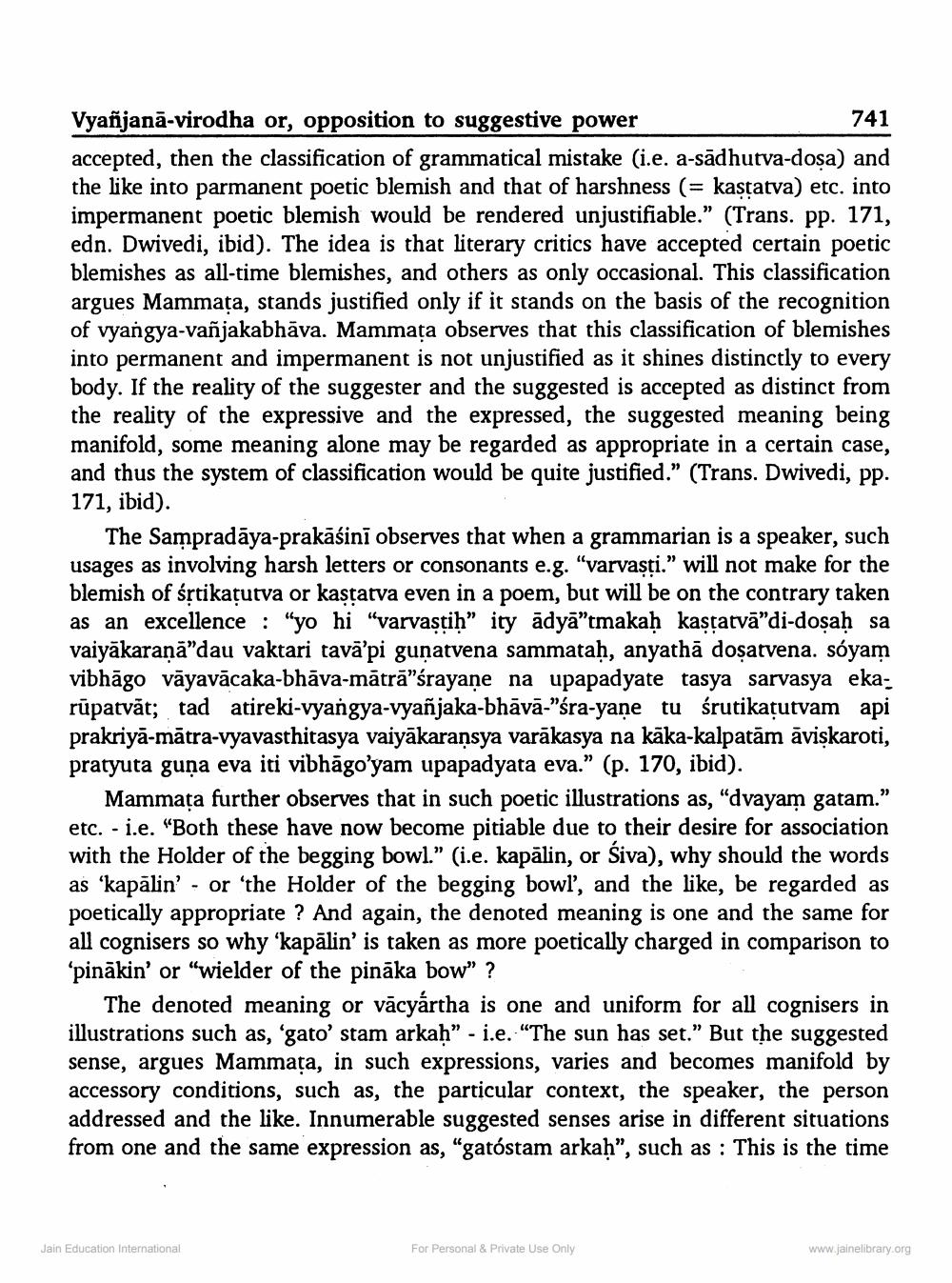________________
Vyañjanā-virodha or, opposition to suggestive power
741 accepted, then the classification of grammatical mistake (i.e. a-sādhurva-dosa) and the like into parmanent poetic blemish and that of harshness (= kastatva) etc. into impermanent poetic blemish would be rendered unjustifiable." (Trans. pp. 171, edn. Dwivedi, ibid). The idea is that literary critics have accepted certain poetic blemishes as all-time blemishes, and others as only occasional. This classification argues Mammata, stands justified only if it stands on the basis of the recognition of vyangya-vañjakabhāva. Mammata observes that this classification of blemishes into permanent and impermanent is not unjustified as it shines distinctly to every body. If the reality of the suggester and the suggested is accepted as distinct from the reality of the expressive and the expressed, the suggested meaning being manifold, some meaning alone may be regarded as appropriate in a certain case, and thus the system of classification would be quite justified.” (Trans. Dwivedi, pp. 171, ibid).
The Sampradāya-prakāśini observes that when a grammarian is a speaker, such usages as involving harsh letters or consonants e.g. "varvasti." will not make for the blemish of śrtikaturva or kastatva even in a poem, but will be on the contrary taken as an excellence : "yo hi "varvastih” ity ädyā”tmakaḥ kaşțarvā"di-dosaḥ sa vaiyākaraņā"dau vaktari tavā’pi gunatvena sammataḥ, anyathā dosarvena. sóyam vibhāgo vāyavācaka-bhāva-mātrā”śrayaņe na upapadyate tasya sarvasya ekarūpatvāt; tad atireki-vyangya-vyañjaka-bhāvā-"śra-yane tu śrutikațutvam api prakriyā-mātra-vyavasthitasya vaiyākaransya varākasya na kāka-kalpatām āviskaroti, pratyuta guna eva iti vibhāgo'yam upapadyata eva.” (p. 170, ibid).
Mammața further observes that in such poetic illustrations as, "dvayam gatam." etc. - i.e. "Both these have now become pitiable due to their desire for association with the Holder of the begging bowl.” (i.e. kapalin, or Siva), why should the words as 'kapālin' - or 'the Holder of the begging bowl, and the like, be regarded as poetically appropriate ? And again, the denoted meaning is one and the same for all cognisers so why 'kapālin' is taken as more poetically charged in comparison to 'pinākin' or "wielder of the pināka bow" ?
The denoted meaning or vācyártha is one and uniform for all cognisers in illustrations such as, 'gato' stam arkah" - i.e. "The sun has set." But the suggested sense, argues Mammata, in such expressions, varies and becomes manifold by accessory conditions, such as, the particular context, the speaker, the person addressed and the like. Innumerable suggested senses arise in different situations from one and the same expression as, "gatóstam arkah", such as : This is the time
Jain Education International
For Personal & Private Use Only
www.jainelibrary.org




